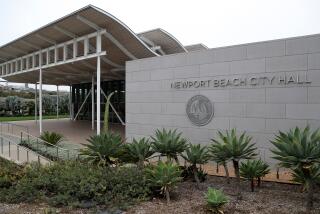Trash Industry Faithful Patron of O.C. Officials : Contributions: Current supervisors have received $135,000 from the haulers the board regulates.
In the late 1950s, getting a piece of Orange County’s trash business was simple: You started by heading over to the Elks Club in Santa Ana.
There you met with Adam Schleining, a union organizer from Portland, Ore., who took over Santa Ana’s trash business in 1952 and eventually became an Orange County garbage kingpin. Gregarious, outgoing and hard-drinking, Schleining held court at a corner table in the club, and he--not any public agency--suggested where your trash company should set up shop.
Times have changed. Schleining--whose power stemmed from his encyclopedic knowledge of the county’s trash business--died years ago, and today it is city councils and the Orange County Board of Supervisors who dole out millions of dollars in local hauling contracts and regulate an industry that bills residents and businesses here for more than $350 million a year.
At the same time, the trash industry has become a faithful political patron. A Times Orange County Edition computer-assisted investigation found that candidates for the Board of Supervisors have received $198,517 in political contributions from the waste industry and its representatives during the past 15 years.
The overwhelming winners in that game have been the 11 supervisors who held office during that period. Their campaigns received $161,284, while their political adversaries were limited to $6,975. Another $30,258 went to three candidates who in 1986 ran for the seat being vacated by Supervisor Ralph Clark.
And the five current supervisors, who directly oversee trash contracts for about 150,000 Orange County residents and whose votes on landfill dumping rates affect every resident and business in the county, have fared especially well.
Those five supervisors have raised more than $135,000 in contributions from the waste industry. And in cities throughout Orange County, the same pattern emerges: Haulers are consistent campaign contributors to council members, who vote on franchises and rates.
Some California cities find that practice--where government contractors give campaign cash to elected officials--so deplorable that they’ve banned it. And even though advocates of new rules complain that allowing government contractors to make contributions undermines the public’s confidence, no Orange County government has followed suit.
Supervisors here note that the contributions from haulers are legal, and they defend those donations as no different than the campaign money they get from other industries.
“I don’t see any problem,” said Supervisor Harriett M. Wieder, who has received strong support from the waste industry during her years on the board. That view was echoed by several of her colleagues.
But others suggest that the supervisors ought to rethink that position.
“The better option for a supervisor would be not to accept the money,” said Lisa Foster, executive director of California Common Cause, a leading campaign reform organization. “Then there would be no question.”
Steady Source of Cash
In fact, the waste industry’s political contributions make it one of the steadier sources of Orange County campaign cash. Waste haulers and their representatives are the largest contributors of any industry that is directly regulated by the county government, The Times investigation found.
“Just like any local business that works with local government, we get solicited,” said Robert J. Morris, a vice president for public policy development at Chicago-based Waste Management Inc., the world’s largest waste disposal company. “We take those requests on a case-by-case basis and decide who we should contribute to.”
Some waste company executives also travel with the county’s political and social elites. Several of the county supervisors tout their local hauling companies as models of well-run local businesses.
The Taormina brothers of Anaheim, who run the Taormina Industries Inc. waste business, are among that city’s most prominent charitable contributors. And when Stanley Tkaczyk, a part owner of Huntington Beach-based Rainbow Disposal, was married last month the festivities were hosted by a leading Republican fund-raiser and attended by the head of the county Republican Party and two supervisors, Wieder and Thomas F. Riley.
Garbage haulers are not the only companies that get government business even as they are making contributions to the officials who regulate or negotiate contracts with them. Cable TV operators receive exclusive government franchises, many parking companies get government contracts and traffic schools are government accredited. But all of those other industries combined give far less than the haulers.
As an industry, law firms give more than garbage haulers; so do bankers and finance industry executives. The biggest supervisorial donors by far are developers and other real estate interests. But their relationship to county government is different: Businesses in that group do not have government contracts, and though the supervisors can reject their projects, they don’t control their contracts or set their rates, which the board does for trash haulers.
Still, the county’s 13-year-old campaign finance law does not bar supervisors from accepting donations from government contractors, and the members have never imposed that requirement on themselves. Instead, the county campaign law, known as TINCUP, allows supervisors to accept up to $1,944 from a contributor during any four-year period before having to abstain from matters involving that donor for four years.
Former Orange County Planning Commissioner Shirley L. Grindle, TINCUP’s principal backer and the author of a new campaign finance proposal that county voters will consider in June, thinks the system would be cleaner if board members refused to accept contributions from their contractors.
“I think if you’re bidding for contracts from a government where the elected officials are passing judgment, you shouldn’t be giving contributions,” she said. “That just looks bad.”
Critics See a Conflict
In some areas, tight limits have been placed on government contractor contributions. The California Political Reform Act prohibits officials who sit on regulatory agencies--such as the Public Utilities Commission and the California Coastal Commission--from voting on matters that involve any contributor who has given them more than $250 during the preceding year. Contributors also may not top the $250 limit to a candidate within three months after such a vote.
That limit does not apply to lawmaking bodies, which include the state Legislature, boards of supervisors and city councils. In most cases, that doesn’t make much difference because the Legislature, for instance, does not award many contracts.
But Foster said that when the supervisors set rates or award franchises, they are acting more like a regulatory agency than a legislative body.
“The same principle really should apply,” she said.
To meet that standard, Orange County supervisors would have to change their habits of raising funds from the waste industry substantially.
In 1991, for instance, the supervisors awarded two sets of garbage franchises, first for residential pickup in the unincorporated areas and later for commercial hauling. The residential contracts alone covered more than 46,000 homes and involved more than $6 million in annual gross receipts; the value of the 13 commercial contracts is harder to determine.
Haulers say those franchises generally are smaller but more profitable. No one outside the industry knows for sure, however, because--unlike utility companies that provide such public services as electric power and natural gas--garbage haulers keep tight control over their books and are not required to open them for inspection.
The Times investigation found that in the 15 months around the residential franchise votes in February, 1991, the five supervisors received $17,085 from waste companies. Of that money, $15,385 came from firms that gave more than $250 to a single candidate. All five supervisors received at least some contributions that topped the $250 threshold that applies to state agencies. Supervisor Wieder was the only board member to abstain because she had received more than the $1,944 TINCUP limit from one of the haulers.
If members of the state Coastal Commission had received those contributions, they would have had to abstain from matters involving the donors. City council members in South San Francisco or Poway or Gardena would have been forced to turn down the money altogether, since those cities bar government contractor contributions. In Orange County, the rules are different, and the contributions were legal, as were the votes.
Do the contributions create a conflict of interest for the supervisors? Or do they compromise the supervisors’ votes when they consider landfill dumping fees, which are passed on to cities and haulers--and ultimately customers?
In a series of interviews, four of the five supervisors said no. The fifth, Board Chairman Roger R. Stanton, did not return phone calls, but said through an aide that contributions had not created a conflict for him during his years as a supervisor or a Fountain Valley councilman and mayor.
“The waste business is a service business,” said Supervisor Gaddi H. Vasquez, whose $23,875 in waste industry contributions put him in the middle of the pack among the five sitting board members. “As a consumer and a resident, and as a supervisor, let me assure you that my highest priority in awarding contracts is rewarding service.”
Wieder, who has received $43,599 in waste industry contributions during her time as a supervisor, agreed.
“I think we’ve done a very good job in keeping the industry clean here,” she said. “The contributions haven’t made any difference.”
Some observers are unconvinced.
“Obviously, there is a direct connection between the contribution and the relationship between the supervisors and the haulers,” said Bill Mitchell, who chairs the Orange County chapter of Common Cause. “The public would have a greater sense of security if they felt that their elected officials were acting without any conflicts, and what you see here is a conflict.”
Taorminas and Roth
Among many observers, including some in and around county government, it is Supervisor Don R. Roth and his relationship with one local hauler that come under the most fire.
Roth and the family that runs Anaheim’s trash collection, the Taorminas, have enjoyed a longstanding friendship, dating back to even before he became a City Council member and mayor of that city. Since 1985, when Roth set his sights on a supervisorial seat, the Taorminas have contributed $6,800 to his political career.
That’s more than the company has given to the rest of the supervisors combined.
Roth is one of Taormina Industries’ most impassioned boosters, and he voted in 1991 with his colleagues to award the company a county franchise for 1,400 residential customers in north Orange County, worth roughly $188,000 a year in gross receipts. That vote was legal, since all but $500 of the Taormina contributions to Roth came more than four years earlier--in 1985 and 1986.
But Roth’s relationship with the company has separated him from the rest of the supervisors on occasion.
When the Taorminas abruptly pulled their business out of the Orange County landfills last year, they were condemned by many city managers, haulers and almost every major county official, many of whom publicly urged the company to reconsider. Losing the Taormina dumping fees would have cost the county landfills $12 million a year, or roughly 10% of the system’s overall budget.
Rather than join the chorus of critics, Roth took pains to praise “the Taormina boys” in meeting after meeting, sometimes to the surprise of his colleagues.
In a recent interview, Roth again offered a torrent of praise for Taormina Industries, which he called an “impeccable organization.” He credited the company’s founder with building the business up from nothing and called the brothers who now run it “two of the finest people I’ve ever met.”
Asked about the contributions he has received from the Taorminas, Roth angrily replied, “I wish you guys would get off of that kick,” referring to The Times’ ongoing investigation of campaign contributions to county supervisors. “You’re not going to be satisfied until you see every county supervisor and every lobbyist hanging by the neck. . . .”
Roth then challenged the premise that the Taorminas were “significant” contributors.
“What’s significant?” he asked. “Who decides what that is?”
Told that the family and its company gave more to candidates for Anaheim City Council than any other contributor in that city, Roth shrugged, and an aide intervened. “I think it’s safe to say that the Taorminas contribute to Don because they know him from when he was mayor, and they admire him and respect the job he’s done,” said the aide, Dan C. Wooldridge.
Vincent Taormina, chief executive officer of Taormina Industries, said the family’s relationship with Roth predates the supervisor’s political career. Taormina said Roth was the real estate agent who sold the family its first home in Anaheim and added that Roth and the Taorminas are longtime members of the local Lions Club.
“We think highly of Don Roth,” Taormina said. “I think he’s been to all our births; to our weddings. He is our friend.”
Price of Doing Business
Other haulers and their representatives cite more practical reasons for their giving to officials.
“It’s just a reality of current life that if you’re going to deal with certain public agencies, you’re going to have to adopt this posture,” said VerLyn N. (Sonny) Jensen, an attorney who represents Waste Management. “What would happen if I told a supervisor who asked me to take some tickets to a fund-raiser that I was just going to shine it? What kind of reception would I get on the fifth floor (of the County Hall of Administration, where the supervisors have offices) next time I was there?”
Another local hauler, who asked not to be identified because he feared retaliation by county officials, also said he and his company make contributions because the supervisors request them. He added that the donations have become so ingrained in the process that haulers simply budget for them the way they would for new equipment or research.
But while many haulers accept that as a way of life, governments elsewhere have moved to ban it.
Take Gardena, a Los Angeles County city that in 1976 passed a sweeping campaign finance reform law. Among the provisions of that law is a flat ban on soliciting or accepting a campaign contribution from any person or company that holds a contract with the government or is negotiating for one.
“I think this kind of ordinance is very important. It cleans up the process,” said Donald L. Dear, Gardena’s mayor.
A 1989 study by the nonprofit California Commission on Campaign Financing endorsed that idea, and encouraged other governments to pass similar measures.
“The commission believes Gardena’s provision prohibiting city contractor contributions to be an excellent innovation,” the report said. “It has apparently helped to relieve elected officials from political pressures regarding contracts and has improved residents’ perception of city government.”
On the June ballot, Orange County voters will get the chance to consider a sweeping overhaul of the county campaign finance system. That proposal would prohibit a contributor from giving more than $1,000 to any candidate during a four-year election cycle. It does not single out government contractors for any special limitations, but that would not prevent the supervisors from enacting a ban like Gardena’s.
Although Roth voted in favor of putting the campaign reform proposal on the ballot, he says he opposes limits on contributions, instead preferring only that donations be publicly disclosed. Other supervisors support contribution limits, but reserved judgment on the idea of banning campaign contributions from government contractors until they have had a chance to study such a plan.
Wieder, for instance, said she had not considered the idea in detail, but added: “I don’t think that’s the answer.”
Many who have studied the problem, however, believe that tougher limits would benefit both the supervisors and the garbage industry. Robert M. Stern, the principal author of California’s Political Reform Act, said that bans on government contractor contributions bolster public faith in government and ensure that contract awards are handled cleanly.
“Why are the (Orange County) supervisors asking people with contracts to contribute?” Stern asked. “There’s something wrong about that. It just leaves a bad taste in your mouth.”
ABOUT THIS SERIES
Sunday: The recycling era and higher garbage rates
Today: The waste industry as political patron
Tuesday: The first family of Anaheim garbage disposal.
Reporting Methods
Figures for this Dollar Politics series were developed as part of a two-year Times Orange County Edition investigation using a computer to analyze 15 years of contributions to candidates for the Orange County Board of Supervisors. The period was selected to begin just before the enactment of the county’s 1978 campaign reform law and the database is continually being updated as new contributions are made.
Candidates are required to file those statements with the Orange County registrar of voters, and this study identified 19,814 contributions from all sources, including individuals, corporations, political action committees and other groups. Candidates are required to itemize contributions of $100 or more.
The information has been edited to remove duplicate entries and to confirm links between related organizations and contributors that had gone by different names during the study period. Where any links were unclear, those contributions were not categorized, so in some cases the findings are deliberately understated.
The results have been checked against other government-maintained data, including the registrar’s list of major campaign contributors, the state’s list of registered political action committees and the county’s list of waste company franchise holders. The computer research was performed by staff writer Mark Landsbaum, while staff writer Jim Newton reported and wrote the stories.
Supervisors’ Share of the Haul
Orange County’s five supervisors have received more than $135,000 in campaign contributions from waste companies, their officers, attorneys and paid political consultants.
Harriett M. Wieder: $43,599 (119 contributions since 1978)
Don R. Roth: $31,875 (45 contributions since 1985)
Gaddi H. Vasquez: $23,875 (76 contributions since 1987)
Thomas F. Riley: $21,475 (54 contributions since 1977)
Roger R. Stanton: $17,600 (38 contributions since 1980)
Top Trash Donors
Orange County’s hauling companies have given to candidates for the Board of Supervisors for many years. The biggest donors in the past 15 years:
Rainbow Disposal & subsidiaries: $17,700
Waste Management & subsidiaries: $16,610
Solag Disposal: $14,779
Taormina Industries & subsidiaries: $13,325
Orange County Steel Salvage: $10,380
Jaycox Disposal: $9,730
Western Waste Industries: $7,090
Briggeman Disposal Services Inc.: $6,475
Edco Disposal Corp.: $5,700
Genstar: $4,679
All other haulers combined: $49,372
Haulers Back Incumbents
Local waste haulers, like other big-time campaign contributors, overwhelmingly favor incumbents when they make donations.
Incumbents: $161,284 (95.8%)
Challengers: $6,975 (4.2%)
Note: In 1986, when there was a race for an open seat on the board, another $30,258 was given by waste interests to three candidates--Don R. Roth, James Beam and Jerry Patterson. They were seeking the seat being vacated by the retirement of Supervisor Ralph Clark. Roth won that campaign.
Source: Campaign disclosure reports, 1977-91
Researched by Mark Landsbaum / Los Angeles Times
Give and Take: Haulers’ Donations to Current Supervisors and the Contracts They Received in 1991
Here is a look at the eight residential trash franchises awarded in 1991 in unincorporated areas, the haulers who won the contracts and the contributions they have made to the five current supervisors since 1977. Of the top 10 waste industry contributors over the past 15 years, only three did not receive franchises. Two of those have gone out of business and the other is no longer in the trash-hauling business.
Briggeman Disposal Services Inc.
Campaign contributions: $5,525
Franchise revenue*: $470,400
Dewey’s Great Western Reclamation (Waste Management Inc.)
Campaign contributions: $11,485
Franchise revenue: $4,690,560
MG Disposal Service Inc.
Campaign contributions: $3,100
Franchise revenue: $40,320
Solag Disposal Inc.
Campaign contributions: $12,325
Franchise revenue: $712,320
Stanton Disposal
Campaign contributions: $200
Franchise revenue: $2,150
Taormina Industries Inc.
Campaign contributions: $12,450
Franchise revenue: $188,160
Western Waste Industries
Campaign contributions: $7,340
Franchise revenue: $40,320
Total campaign contributions for all franchise holders since 1977: $52,425
Estimated annual revenue from county-awarded franchises: $6,144,230
* Franchise revenue is an estimate of annual receipts computed by multiplying the number of customers in a service area by a monthly trash rate of $11.20.
Source: Orange County Integrated Waste Management Department Researched by MARK LANDSBAUM / Los Angeles Times
More to Read
Start your day right
Sign up for Essential California for news, features and recommendations from the L.A. Times and beyond in your inbox six days a week.
You may occasionally receive promotional content from the Los Angeles Times.







